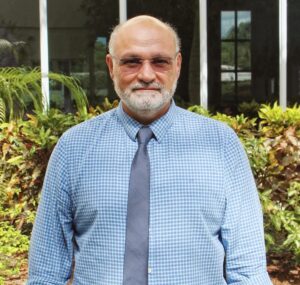 Dr. Tzivion earned his master’s and Ph.D. degrees in Microbiology & Immunology at the Hebrew University, Hadassah-Medical School in Jerusalem. Following his graduate studies, he completed a 5-year postdoctoral fellowship at the Department of Molecular Biology, Massachusetts General Hospital, Harvard Medical School, Boston, specializing in molecular cancer biology and metabolic disorders. Dr. Tzivion held faculty positions and led his research laboratories at the Department of Physiology, Texas A&M University Health Science Center (2000-2004), the Karmanos Cancer Institute, Wayne State University Medical School (2004-2009), and the Cancer Institute, University of Mississippi Medical Center (2009-2015). He relocated to the Caribbeans in 2015, undertaking the role of Associate Dean of Research and Research Education at Windsor University School of Medicine in St. Kitts. He assumed his current position of Professor of Biochemistry, Cell Biology, and Genetics at AUA in 2022.
Dr. Tzivion earned his master’s and Ph.D. degrees in Microbiology & Immunology at the Hebrew University, Hadassah-Medical School in Jerusalem. Following his graduate studies, he completed a 5-year postdoctoral fellowship at the Department of Molecular Biology, Massachusetts General Hospital, Harvard Medical School, Boston, specializing in molecular cancer biology and metabolic disorders. Dr. Tzivion held faculty positions and led his research laboratories at the Department of Physiology, Texas A&M University Health Science Center (2000-2004), the Karmanos Cancer Institute, Wayne State University Medical School (2004-2009), and the Cancer Institute, University of Mississippi Medical Center (2009-2015). He relocated to the Caribbeans in 2015, undertaking the role of Associate Dean of Research and Research Education at Windsor University School of Medicine in St. Kitts. He assumed his current position of Professor of Biochemistry, Cell Biology, and Genetics at AUA in 2022.
Research Interests
Dr. Tzivion’s research has centered over the years on insulin and growth factor-activated signaling pathways and their implications in metabolic disorders, cancer pathogenesis, and aging. In recent years, his research has expanded to address public health problems, encompassing both communicable and non-communicable diseases, with a specific focus on prostate cancer disparities in the Caribbean region.
Dr. Tzivion’s work has been published in top scientific journals, including two landmark papers in Nature, and garnered over 6,300 citations. Dr. Tzivion is a frequent guest speaker at international conferences and universities worldwide and has served on major grant review panels, including the NIH and DOD. His editorial experience includes serving on the editorial board of BBA-Molecular Cell Research, a leading biochemical journal, for 14 years. Additionally, he has guest-edited two highly cited special journal issues on molecular aspects of metabolic disorders, cancer pathogenesis, and aging.
Selected publication:
Davaakhuu G, Ramakrishnan G, Coile CE, Miele L, Atfi A, Rana A, and Tzivion G. Expression of Drosophila nicotinamidase in mammalian systems protects from wide-ranging stress insults via activation of PARPs and sirtuins. Manuscript in preparation, 2023.
Ramakrishnan G, Davaakhuu G, Chung W, Zhu H, Rana A, Filipovic A, Green AR, Atfi A, Pannuti A, Miele L, and Tzivion G. AKT and 14-3-3 regulate Notch4 nuclear localization. Scientific Reports 5; 8782, 1-7, 2015.
Ramakrishnan G, Davaakhuu G, Kaplun L, Chung W, Rana A, Atfi A, Miele L, and Tzivion G. Sirt2 deacetylase is a novel AKT binding partner critical for AKT activation by insulin. JBC 289, 6054-6066, 2014.
Leicht DT, Balan V, Zhu J, Kaplun A, Bronisz A, Rana A, and Tzivion G. MEK-1 activates C-Raf through a Ras-independent mechanism. BBA-Molecular Cell Research 1833, 976-986, 2013.
Tzivion G, and Hay N. PI3K-AKT-FoxO axis in cancer and aging. BBA-Molecular Cell Research 1813, 1925, 2011 (special journal issue editor).
Dobson M, Ramakrishnan G, Ma S, Kaplun L, Balan V, Fridman R, and Tzivion G. Bimodal regulation of FoxO3 by AKT and 14-3-3. BBA-Molecular Cell Research 1813, 1453–1464, 2011.
Balan V, Miller G, Kaplun L, Balan K, Chong Z, Li F, Kaplun A, VanBerkum MFA, Arking R, Freeman DC, Maiese K, and Tzivion G. Lifespan extension and neuronal cell protection by Drosophila nicotinamidase. JBC 283, 27810-27819, 2008.
Tzivion G. Mitogen-activated protein kinases: new insights on regulation, function, and role in human disease. BBA-Molecular Cell Research 1773, 1149, 2007 (special journal issue editor).
Tzivion G, Luo Z, and Avruch J. A dimeric 14-3-3 protein is an essential cofactor for Raf kinase activity. Nature 394, 88-92, 1998.
Luo Z, Tzivion G, Belshaw PJ, Vavvas D, Marshall M, and Avruch J. Oligomerization activates c-Raf-1 through a Ras-dependent mechanism. Nature 383, 181-185, 1996.
Research Opportunities for Students and Faculty:
1. Identifying the underlying causes of prostate cancer disparities in Antigua, and the Caribbean’s at large.
2. Developing outreach programs for promoting healthy lifestyle in Antigua: focus on noncommunicable diseases, including obesity, diabetes, and mental health.
3. Developing approaches for targeting NAD metabolism and sirtuins in metabolic disorders, aging, cancer, and neurodegenerative diseases.
4. Elucidating the regulation of insulin and growth factor-activated signaling pathways and their role in metabolic disorders, cancer pathogenesis, and aging.
Contact information:
Guri Tzivion, PhD
Professor, Department of Biochemistry, Cell Biology and Genetics
Room: GC34
Email: [email protected]
Tel: 1-268-484-8900 ext. 1094

